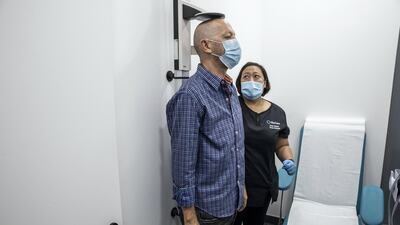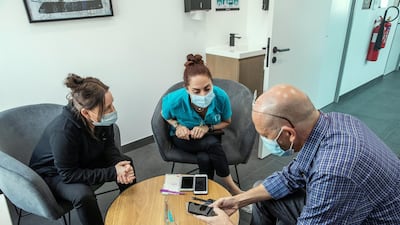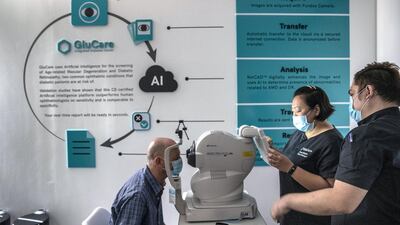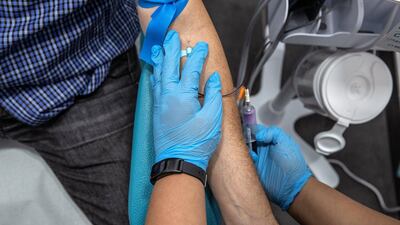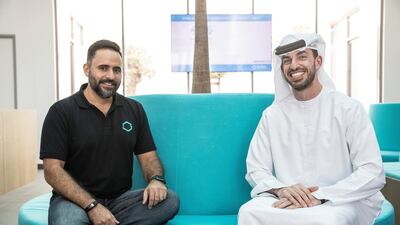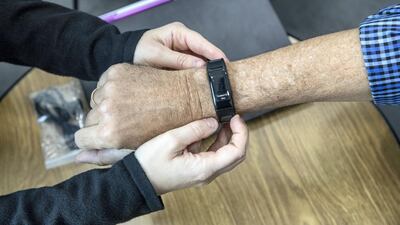Related: Cutting-edge wearable tech could slash preventable deaths, McKinsey health report finds
A Dubai start-up company is embracing new technology to help boost the UAE's fight against diabetes.
The GluCare Integrated Diabetes Centre promises to utilise patient data like never before to reduce risk and prolong the lives of those with the chronic condition.
The centre introduced a diabetes monitoring device, in the form of a wristband, to help compile a fuller picture of the care needs of each patient.
The McKinsey Global Institute, an international think tank, highlighted the importance of innovation in improving health care in a recent report.
“Doctors now need to be highly trained technicians to look at data and technology as a means to understand a patient’s needs,” said Ali Hashemi, co-founder and chairman of GluCare.
“In this context, we are using technology to gather information.
“If a patient regularly visits a doctor, they will be looking for any changes since their previous visit.
“This system allows us to constantly monitor patient health and look at any changes that occur.
“Having that information in advance allows a doctor to dedicate the appointment to coaching, education and advising the patient as to how they can improve their health.”
Digital therapeutics is a developing area of advanced health care, using computer programmes and machine learning to manage, treat or prevent disease or illness.
The GluCare system involves a wristband that collects a huge amount of biological data, including heart rate, respiratory rate, sleep patterns and skin temperature.
Other equipment in the GluCare kit for patients can monitor blood glucose and blood pressure.
More conventional means of gathering data, such as questionnaires on diet and general health, are also used.
That information is fed into a connected mobile app that can be viewed by the wearer and physician to monitor patient health in real time.
Coaches can offer feedback using messages relating to the changes seen on a remote dashboard where health information is displayed.
Machine learning algorithms look at the data to detect trends or red flags that could indicate early signs of ill heath such as hypertension or heart arrhythmias, as well as symptoms related to diabetes.
Product developers claim the band is up to 100 times more accurate than other wearable devices on the market.
By using different wavelengths of light emitted from the wristband into the body, more accurate biological data can be collected.

Dr Ihsan Almarzooqi, co-founder and managing director of the centre, said the technology would revolutionise diabetes care.
“The current mechanism of managing a diabetic with doctors having a quick chat every quarter and then sending the patient away with medication is not working,” he said.
“The prevalence has gone up, the costs have gone up and people are getting diabetes at a younger age.
“Movement data, heart and respiration rate and a lot of other information can improve care, but it is not something that is always asked during a doctor’s consultation.”
GluCare partnered with several health insurance providers with the potential to offer the service nationwide.
Challenges will include how to manage a huge amount of data as more patients sign up to the programme and to help coaches give real-time feedback to patients on their progress.
In a cohort of 100,000 patients, for example, a petabyte (a million gigabytes) of biological data could be extracted.
About 20 per cent of the UAE lives with diabetes, with about 40 per cent of UAE deaths from Covid-19 occurring in those with the condition, making it a serious risk factor.
Research into the effectiveness of similar home-monitoring devices, health data tracking and online medical appointments is under way at Dubai Health Authority.
A study on patients at the Dubai Diabetes Centre to find out how similar technologies could be absorbed into the health system is examining how change can save lives.
Under the current method of treatment, diabetics have home monitoring devices to check their blood sugar and blood pressure.
Data is stored in devices that can be viewed by an endocrinologist during medical appointments every two to three months.
During the DHA study, 40 patients were provided four home monitoring devices to check blood pressure, blood glucose, heart rate and a pulse oximeter to measure blood oxygen.
A pill box beeped to remind patients when to take their diabetes medication.
Failure to take prescribed medicine at the correct time resulted in an alert being sent to the centre.
The patient's mobile phone collected all relevant biodata for the duration of the study to improve clinical management of their condition.
A video call feature is also being tested during the study.
“This kind of real-time monitoring helps the patient stay on-track,” said Dr Hamed Farooqi, director of the Dubai Diabetes Centre.
“It ensures there is no time-gap in terms of physical consultation which means complications can be greatly reduced, which is important given the nature of the disease.”
